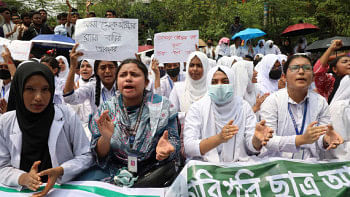Juvenile delinquents and the Children Act

Since the gruesome murder of Adnan Kabir, a teenage resident of the capital's Uttara, the growing gang culture has been much talked about. While gang members who are above the age of majority committing grievous offences may be held liable in accordance with the Penal Code 1860, it is of utmost importance to observe the post-crime circumstances of offenders falling within the purview the Children Act 2013.
With regard to the children who come in conflict with the law, certainly a softer and humanistic approach has been taken in the Children Act 2013 in order to meet international standards under the UN Convention on the Rights of the Child. As per section 33(1) of the Children Act 2013, no child shall be sentenced to death, imprisonment for life or imprisonment. Where a child is found guilty of an offence punishable with death or imprisonment for life, the Children's Court may order the child to be detained in a Child Development Centre for a period of not less than 3 and not more than 10 years. However, according to section 34 of the Children Act 2013, if a child is found guilty of an offence not punishable with death or imprisonment for life, s/he may be ordered to be detained in a Child Development Centre for up to 3 years.
Moreover, a child whose behaviour, character and personality would experience positive changes and who had not been charged with an offence of murder, rape, robbery, dacoity, drug-dealing or any other heinous or serious offence, in such circumstances, steps may be taken for the release of such child as soon as s/he reaches the age of 18. With that view, section 34 further mentions that recommendation may be sent to the government 3 months prior to the child's attainment of the such age of majority.
It is to be noted that where the child is charged with offences, the nature of seriousness of which are as mentioned in the previous paragraph, and provided the case would still be under trial on the child's attainment of the age of 18, such child may be transferred by the Child Development Centre to the Central or District Jail, subject to approval of the Children's Court as per section 34(3) of the concerned Act.
The provisions certainly seem maturely drafted on the face of it, considering the fact that the Act extends sensitiveness towards the matter of trying children, even to the extent of guiding the courts not to use the terms 'offender', 'convicted' or 'sentenced' in relation to children, and instead mention 'a person found guilty of an offence', 'a finding of guilt', or 'an order made upon such findings' as the case may be, or such other synonyms as the court deems appropriate may be used.
However, punishment of children as per the Act has its share of problems. While the Act provides that children are to be kept in different rooms according to their age and grievousness of the crimes that they had committed, it fails to mention the standard of care and steps of rehabilitation to be followed by these Child Development Centres. This burden however falls on the government by means of issuing office orders, according to the Act. Of the correctional homes existing in Bangladesh, ones in Tongi and Jessore are well known for accommodating male child offenders. On the other hand, there is an establishment in Gazipur solely for the female – gender disaggregation rules for accommodation mentioned in the Act are therefore strictly abided by. Although, during the past years, there have been various reports on national dailies regarding the mismanagement and poor conditions of these centres. The children are not provided with proper diet, medical care and education, let alone rehabilitative steps. The severity of complaints heightened to an extent that, the children are reportedly being supplied with small amount of narcotics in order to keep them calm and in control. Such clearly is a violation of the true spirit of the Children Act.
Therefore, it is a crying need for the government to direct, closely monitor, coordinate, review and evaluate the activities of the Child Development Centres. The counsellors of these centres should receive proper training in order to help re-educate these juvenile delinquents. The government should consider developing a step-by-step treatment programme that would include care, parental affection and education in order to provide these juveniles, an opportunity to rehabilitate themselves.
The writers are Lecturers in Law at North South University.

 For all latest news, follow The Daily Star's Google News channel.
For all latest news, follow The Daily Star's Google News channel. 



Comments